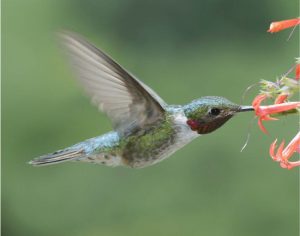Third US National Climate Assessment reports our ecosystems are already changing
Natural resources can help us adapt to extreme climate events
FOR IMMEDIATE RELEASE: May 6, 2014
Contact: Liza Lester (202) 833-8773 x 211; gro.asenull@retsell

A male broad-tailed hummingbird sips nectar. The phenology of the early-season nectar plants the birds favor is changing more rapidly than the birds, leading to the potential for a mismatch that could affect both birds and their nectar resources. Credit, David Inouye.
Today, the US Global Change Research Program released its Third National Climate Assessment (NCA) of the impacts of climate change on biodiversity and ecosystems. The NCA is the most comprehensive peer-reviewed analysis of climate change’s impacts in the United States, informing Americans about the effects of climate change in their backyards.
“As an ecologist, you can’t escape the effects of climate change on natural resources. We’re observing climate impacts in nearly all natural and managed ecosystems,” said Ecological Society of America President Jill Baron, an ecosystem scientist with the US Geological Survey in Fort Collins, Col., and a contributor to the NCA. “In order to protect biodiversity and the natural resources that we rely on, we need to be developing policy now. The National Climate Assessment provides guidelines for how to respond and adapt.”
Our planet is already changing. Current climate trends are bringing great disruption to ecosystems and the many species that share this planet—including people, because this is our environment, our home, our life support system. The economic costs of wildfire, drought, storms, fishery losses to ocean acidity, and the inundation of our coastal cities by sea level rise are clear.
We depend on ecosystems for the pollination of our crops, the support of our fisheries, the cleanliness of our water—and the integrity of beloved wild areas enjoyed by fishers, hunters, hikers, and boaters.
Intact ecosystems improve soil, filter water, store carbon, and cycle nutrients. They buffer communities from urban heat waves, floods, erosion, and storm surge. Reefs, swamps, and coastal marshes, for example, help absorb the energy of big storms. Coastal development has denuded many of these protections, as was dramatically demonstrated in Superstorm Sandy’s collision with New York City and the New Jersey coast in 2012.
“We know that ecosystems provide these benefits, but climate and other global changes are overwhelming their capacities to protect us,” said Nancy Grimm, professor and Senior Sustainability Scientist at Arizona State University. “These ecosystems are threatened, not just from climate change, but from other changes that we have brought to them. We need to reverse that trend, understand these systems better, and think about how we can bolster their services to society.”
Grimm, a past president of the Ecological Society, contributed to the third NCA. She guest edited a condensed and illustrated version of the biodiversity, ecosystems, and ecosystem services input to the NCA for a special open access issue of the society’s journal Frontiers in Ecology and the Environment in November, 2013.
Find additional details and resources here.
Resources:
- Third National Climate Assessment report, data, and tools (website)
- Special Issue: Impacts of climate change on biodiversity, ecosystems, and ecosystem services. Frontiers in Ecology and the Environment 11(9) November, 2013 (open access). Summary.
- SH Julius et al. Climate change and U.S. natural resources: advancing the nation’s capability to adapt. Issues in Ecology, Fall 2013. (pdf)
The Ecological Society of America is the world’s largest community of professional ecologists and a trusted source of ecological knowledge. ESA is committed to advancing the understanding of life on Earth. The 10,000 member Society publishes five journals, convenes an annual scientific conference, and broadly shares ecological information through policy and media outreach and education initiatives. Visit the ESA website at https://ecologicalsocietyofamerica.org.
Journalists and public information officers can gain access to full texts of all ESA publications by contacting the public affairs office To subscribe to ESA press releases, contact Liza Lester at llester@esa.org.